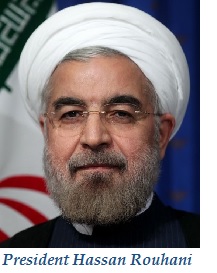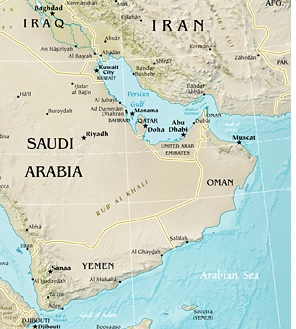Matthew M. Reed
What impact has the fall in global oil prices had on Iran?
The oil price collapse since June has had only a modest impact on Iran— so far. But lower revenues have already forced President Hassan Rouhani to significantly reduce budget projections and even decrease Iran’s dependence on oil. More steps may lie ahead, depending on both the market and the results of Iran’s talks with the world’s six major powers on a nuclear deal.
 In December, Rouhani presented a budget for 2015 based on an average oil price of $72 per barrel— down from about $100 per barrel in the 2014 budget. But oil has been trading below $50 and it may stay low. So the government has slashed the projected price again to $40 per barrel. Rouhani intends to reduce Iran’s dependence on oil from an average of 45 percent of all revenues to about 31.5 percent.
In December, Rouhani presented a budget for 2015 based on an average oil price of $72 per barrel— down from about $100 per barrel in the 2014 budget. But oil has been trading below $50 and it may stay low. So the government has slashed the projected price again to $40 per barrel. Rouhani intends to reduce Iran’s dependence on oil from an average of 45 percent of all revenues to about 31.5 percent.The imploding oil market comes at a time when Iran is already suffering serious economic challenges due to mismanagement, corruption and international sanctions. Inflation remains high even though it has halved to less than 20 percent over the last year.
Iran’s currency, the rial, lost half its value in 2012 amid tightened sanctions and has not recovered. The rial’s value climbed after Rouhani took office in August 2013, but it has since fallen again. By the end of 2014, it was trading on the unofficial “open market” for 35,000 per dollar, a modest improvement to the 40,000 per dollar rate at the end of Mahmoud Ahmadinejad’s term.
In early December, Iran raised bread prices slightly. More subsidy reform could be on the way to help cope with the shortfall in revenue.
Even when prices were high in recent years, sanctions did serious harm to Iran’s economy. But those same sanctions may defer some of the pain from falling prices. Iran’s oil revenues are currently held in customer countries and can only be used to pay for goods and services originating in those countries. For more than two years, revenues have been piling up in banks overseas due to sanctions. By early 2015, they totaled tens of billions of dollars in China, India and other top Iranian customers. Iran may only be adding to these accounts more slowly now that it is selling oil for less.
Oil traders and industry sources report that Tehran is offering generous credit terms to customers so there is a delay between oil delivery and payment. If the pain of the price drop is delayed, it won’t be for much longer.
How is Iran’s shortfall in revenue impacting the debate over nuclear talks?
Falling oil prices have accelerated the debate in Iran linked to the nuclear file. Supreme Leader Ayatollah Ali Khamenei and hardliners in his corner seem to prioritize Iran’s nuclear program over reconnecting the economy to world markets. They argue that belt-tightening, improvements in self-sufficiency and acceptance of some hardship can allow Iran to maintain its nuclear program— without compromising its revolutionary values. Khamenei calls this his “Resistance Economy” program. The concept, however, remains a catchphrase more than a comprehensive set of policies.
By relying on the #nation and internal power, govt. should thwart #sanctions. So in any case, ppl’s well-being & progress won’t be affected.
— Khamenei.ir (@khamenei_ir) January 7, 2015President Rouhani, on the other hand, has argued that Iran's economic prospects are directly tied to sanctions and its relationship with the outside world. “Our political life has shown we can't have sustainable growth while we are isolated,” he told a meeting of economists on January 4. To applause, he contended that Iran's foreign policy must serve its economy. Rouhani may not have dismissed Khamenei's “Resistance Economy” outright, but he surely hit a nerve.
The hardliner response was immediate and fierce. Days after Rouhani’s speech, Judiciary Chief Sadeq Amoli Larijani insisted that “one must not tie economic issues to nuclear talks.” Connecting the issues and debating them provided “reassurance” to Iran’s enemies, Larijani warned.
The debate is far from over but the price collapse is forcing leaders and politicians to pick sides. The supreme leader's allies in the media, judiciary, and military have since warned Rouhani not to incite public opinion against the nuclear program.
What impact have falling oil prices had on Iran’s relations with its oil-rich Gulf neighbors and other OPEC members?
 Iranian officials have blamed the price collapse on Saudi Arabia and the United States. President Rouhani and Oil Minister Bijan Zanganeh have claimed that the collapse is a political conspiracy. “Those that have planned to decrease the prices against other countries will regret this decision,” Rouhani warned in a televised speech on January 13. “If Iran suffers from the drop in oil prices, know that other oil-producing countries such as Saudi Arabia and Kuwait will suffer more than Iran,” he added.
Iranian officials have blamed the price collapse on Saudi Arabia and the United States. President Rouhani and Oil Minister Bijan Zanganeh have claimed that the collapse is a political conspiracy. “Those that have planned to decrease the prices against other countries will regret this decision,” Rouhani warned in a televised speech on January 13. “If Iran suffers from the drop in oil prices, know that other oil-producing countries such as Saudi Arabia and Kuwait will suffer more than Iran,” he added.Other officials, like Deputy Foreign Minister Hossein Amir Abdollahian, have called on Saudi Arabia to cut production in order to lift prices.
To Riyadh, Iran’s complaints are just noise. Other cash-strapped oil producers also want Saudi Arabia to cut production and keep prices up for everyone else. The Kingdom, however, has little confidence that it or OPEC can prop up prices for long.
Instead of gambling on production cuts, the Saudis want to let the market self-correct: They believe in Economics 101. This may take time, but other Gulf and OPEC producers, including Kuwait and the United Arab Emirates, support this strategy. “We cannot continue to be protecting a certain price,” said UAE Energy Minister Suhail al Mazrouei on January 13.
Meanwhile, OPEC hawks like Iran and Venezuela can only watch from the sidelines. Venezuelan President Nicolás Maduro visited Tehran in early January to confer with Iranian leaders. “Our common enemies are using oil as a political weapon, and they definitely have a role in the sharp fall in oil price,” Supreme Leader Khamenei reportedly said in a meeting with Maduro.
Leader at meeting w Mr. Maduro: #Iran's firm decision is to preserve & expand multilateral cooperation w #Venezuela. pic.twitter.com/A1zaN3UdhE
— Khamenei.ir (@khamenei_ir) January 10, 2015Saudi-Iranian relations were grim before the fall in oil prices. Some foreign policy analysts speculate about whether Saudi Arabia has a secondary agenda, namely slashing prices to hurt Iran. But Riyadh would most likely keep production steady even if it had friendly relations with Iran.
How resilient are Gulf economies compared to Iran?
The Gulf states are more dependent on oil revenues than Iran, but they stashed money away over the last half decade to tide them over during busts. Saudi Arabia, Kuwait, the UAE and Qatar are flush with savings, so they can endure lower prices for now. The situation is more challenging for Bahrain and Oman. Unlike Iran, the Gulf states have easy access to international finance and loans.
Some sober analysts have argued in Iran’s reformist media that the price collapse will starve the country's oil and gas industry of much needed continuous investment, doing lasting damage. But Iran did weather the last two price collapses in 1999 and 2009.
Matthew M. Reed is Vice President of Foreign Reports, Inc., a Washington, D.C.-based consulting firm focused on oil and politics in the Middle East. Follow him on Twitter @matthewmreed
Online news media are welcome to republish original blog postings from this website in full, with a citation and link back to The Iran Primer website (www.iranprimer.com) as the original source. Any edits must be authorized by the author. Permission to reprint excerpts from The Iran Primer book should be directed to permissions@usip.org
